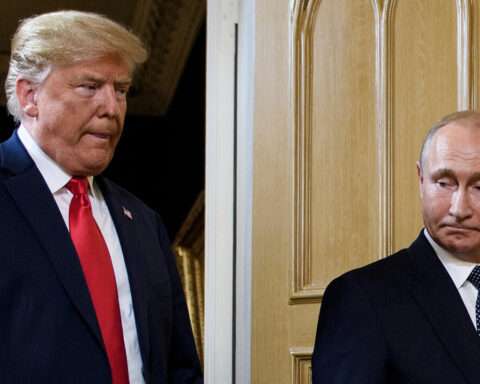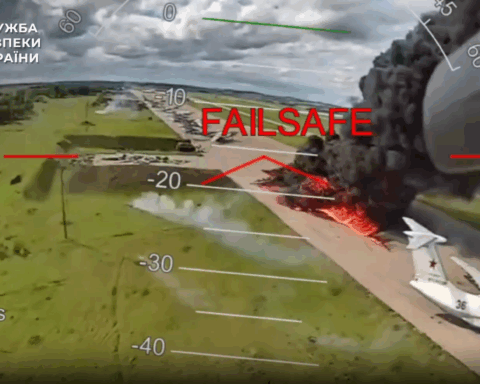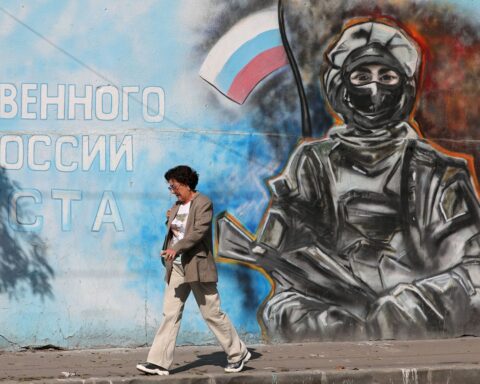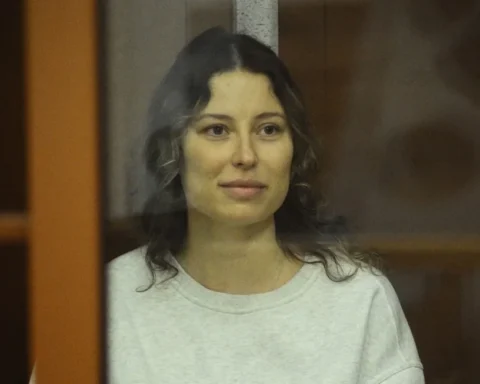As the war in Ukraine rages, Russia n President Vladimir Putin likens himself to Tsar Peter the Great — but critics find a glaring flaw in the comparison. Meanwhile, Dmitry Medvedev provides the poisonous voice-over for a terrible, troubled time.
Here are some of the key developments in Russia over the past week and some of the takeaways going forward.
Ten Years Gone
The more things change, the more they stay the same.
In Russia, the main thing that has stayed the same over the past 10 years has been the president: Vladimir Putin held that office from 2000-2008 and has also held it since May 2012, when he took it back from placeholder Dmitry Medvedev after serving four years as prime minister.
One thing that has changed in those same 10 years: the public persona of Medvedev, who as president conducted what looked like cordial meetings with U.S. counterpart Barack Obama and displayed admiration for aspects of Western life, from the high-tech achievements of Silicon Valley to the goal of democratic governance. During his campaign for the presidency in 2008 and at the end of his term in 2012, he stated that “freedom is better than unfreedom.”
Hate Speech
That’s a far cry from the venomous rhetoric he is becoming known for a decade later, the most recent example being a June 7 post on Telegram in which he lashed out at an unspecified target, saying, “I hate them. They are bastards and scum. They want death for us, for Russia,” and adding that “as long as I’m alive, I will do everything to make them disappear.”
The object of Medvedev’s disaffection was variously interpreted as being Ukrainians or the West. Either way — and regardless of the degree to which Medvedev’s words and actions as present were part of a con game aimed at duping Russians and the wider world — it was a striking reflection of the way things have changed since Putin returned to the Kremlin.
In September 2011, when Medvedev and Putin announced plans to switch places the following year, with Putin reclaiming the presidency and Medvedev becoming prime minister, many citizens who had hoped for change — for movement, at least, toward a Russia whose public servants would serve the public, essentially — were disappointed.
Before Putin even took office again, evidence that his new stint in the top spot would bring less freedom and more unfreedom mounted fast. A wave of large-scale protests driven by anger over elections marred by widespread allegations of fraud and dismay at his decision to return to the Kremlin was met with tightening restrictions on freedom of assembly, including a violent police crackdown on a demonstration on Moscow’s Bolotnaya Square on the eve of his inauguration to a third term on May 7, 2012.
In retrospect, the lonesome optics of his inauguration — riding to the Kremlin ceremony along empty streets, with protesters held at bay at a distance and crowds of well-wishers conspicuously absent — presaged the atmosphere that surrounded his decision nearly 10 years later to launch a large-scale invasion of Ukraine: a decision, by all signs and accounts, taken virtually alone.
‘Blatant Violation’
In terms of suffering and loss of life, the consequences of that decision grow more staggering every day. Thousands of Ukrainian civilians have been killed and millions driven from their homes. Cities and towns have been razed to the ground by Russian bombardments, and accusations of rape, torture, and other crimes committed by Russian forces are mounting.
Deadly fighting rages in the Donbas region of eastern Ukraine as Russia seeks gains after several more setbacks in the weeks following the February 24 invasion.
On June 9, in a development condemned by Amnesty International as a “blatant violation of international humanitarian law on so many counts,” a self-styled court run by Russia-backed separatists handed down death sentences to two Britons and a Moroccan who have been fighting as part of Ukraine’s armed forces.
In Russia between 2012 and 2022, Putin’s clampdown on his opponents, civil society, independent media, and all forms of dissent gathered force — at first steadily and then dramatically with the arrest of poisoning survivor Aleksei Navalny in January 2021 and, after the invasion of Ukraine on February 24, with efforts to efface any sign of opposition to an unprovoked war that appears aimed at erasing Ukraine from the map but also puts Russia’s future at risk.
While gloom prevailed among Russians eager for change in 2012, few could have predicted the enormity of the situation as it stands now: the death and destruction Putin has unleashed in Ukraine and the isolation, economic straits, and uncertainty he has imposed on the citizens of his own country — a state of affairs that political analyst Andrei Kolesnikov summed up as “the complete collapse of everything.”
In fact, few predicted the invasion even in the weeks and days before it occurred, even though Russia had seized Crimea in 2014 and fomented a war in eastern Ukraine that has persisted ever since and now expanded.
‘The End Of Everything’
Kolesnikov, a senior fellow at the Carnegie Endowment for International Peace, suggested in a May 24 article that back in 2011 he and a colleague — writing a proposed program for a second Medvedev term that already seemed increasingly unlikely — did warn of the dangers that would lie ahead if Russia’s leaders looked to the past instead of the future.
“We argued that there were only two options: modernization, or the end of everything — and we were right,” Kolesnikov wrote.
“Russia is unlucky with its future because it is unlucky with its past. Its rulers formulate whatever public image of Russia’s past happens to suit them. That means they are building the future using blueprints from the past,” he wrote. “Right now, Vladimir Putin’s Russia seems to have gone back in time to antiquity.”
Putin has used several arguments to justify a war that Western governments, rights group, and critics at home and abroad say is unjustifiable.
On June 9, he reached back not quite to antiquity but 350 years, to the birth of Tsar Peter the Great, and provided one of the clearest indications yet that his main motive for the invasion of an independent nation is the desire to seize territory that he bizarrely and baselessly claims is rightfully Russian.
Open And Shut
“Peter the Great waged the Great Northern War for 21 years. It would seem that he was at war with Sweden, [that] he took something from them,” Putin said. “He did not take anything from them — he returned [what was Russia’s] and strengthened [Russia].”
“Apparently, it has also fallen to us to return and strengthen,” he said.
Peter the Great, however, is known for strengthening Russia by throwing it open to the outside world and inviting European experts to help build and modernize it.
He is said to have opened a “window on Europe,” while Putin has deeply alienated nations to the West and united Ukrainians against Russia by launching a war that isolates his country and harms its economy, with potentially massive long-term consequences.
“Putin’s Ukraine invasion, many Russians fear, has slammed that window shut,” a news article in The New York Times said.
Steve Gutterman






